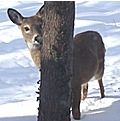- By NYS Comptroller's Office
- Business & Technology
 Print
Print  Fishing and hunting bring a stream of cash to New York's economy, generating the second-highest expenditures in any state at approximately $5 billion, supporting local businesses and jobs across the state, according to a report released Wednesday by State Comptroller Thomas P. DiNapoli.
Fishing and hunting bring a stream of cash to New York's economy, generating the second-highest expenditures in any state at approximately $5 billion, supporting local businesses and jobs across the state, according to a report released Wednesday by State Comptroller Thomas P. DiNapoli."Our 7,500 lakes and ponds, 70,000 miles of rivers, streams and coastline and millions of acres of forest and open space are a natural draw," DiNapoli said. "Meanwhile, residents' and visitors' spending on licenses, equipment and travel boosts our economy and supports our management of fish and wildlife programs."
Nearly two million people fish, hunt or trap in New York, ranking the state third nationwide, DiNapoli's report found. In several New York counties, the number of resident licenses sold equaled more than one-third of the county's population. Fishing is the most popular, with two-thirds of New York participants fishing exclusively, followed by 28 percent who fish and hunt and nine percent who hunt only.
Consumer spending on these sporting activities totaled more than $5 billion in 2011, the most recent year for which such figures are available. Nearly $1.9 billion was spent on trip-related purchases including transportation, lodging and food. Nonresidents generated 20 percent of the revenue collected from license fees in the 2012-13 license year.
Erie County ranked first in total license sales in the 2012-13 season, issuing more than 120,000 licenses and permits. Oswego County ranked first in fishing licenses.
In addition to benefiting the economy, fishing and hunting supports state wildlife programs. Revenues from the sale of annual licenses to fish, hunt and trap have contributed an average of $45.3 million a year to the New York State Conservation Fund in the last five fiscal years. Spending from that fund on state wildlife conservation programs has averaged $44.3 million over the same time period.
The state Division of the Budget estimates $50.2 million in such expenditures in state fiscal year 2015-16. Federal programs that allocate certain federal hunting, fishing and boating revenues to the states for wildlife programs have provided an average of more than $24 million a year for New York since 2011.
v11i47




